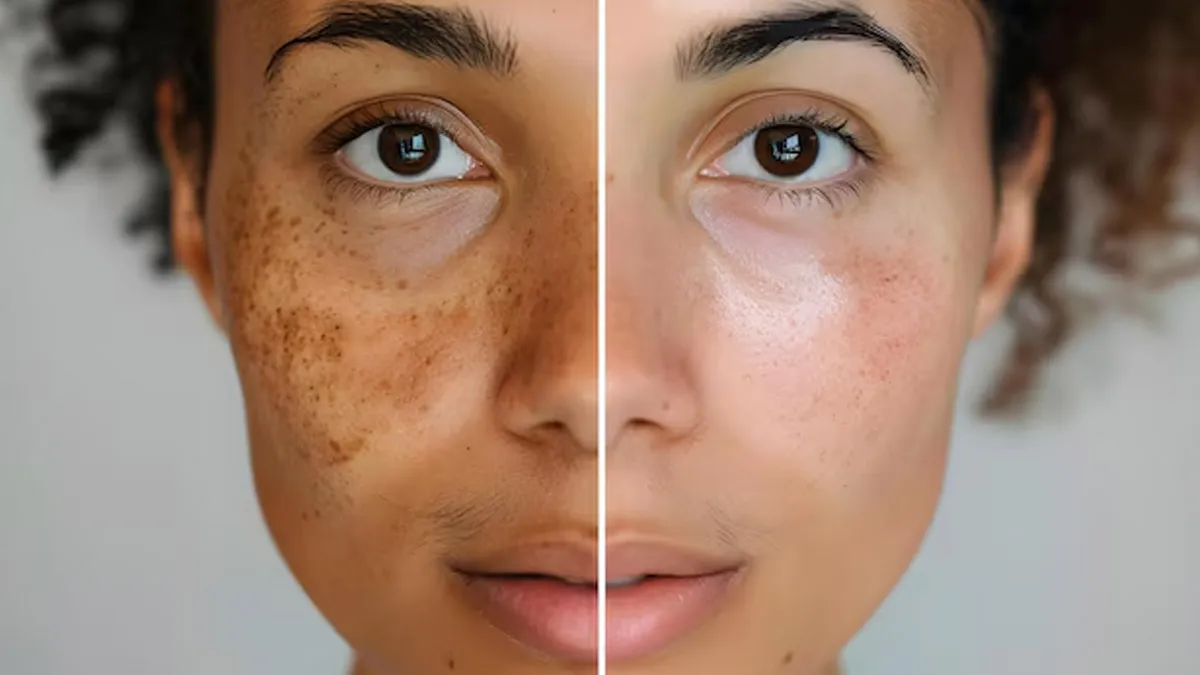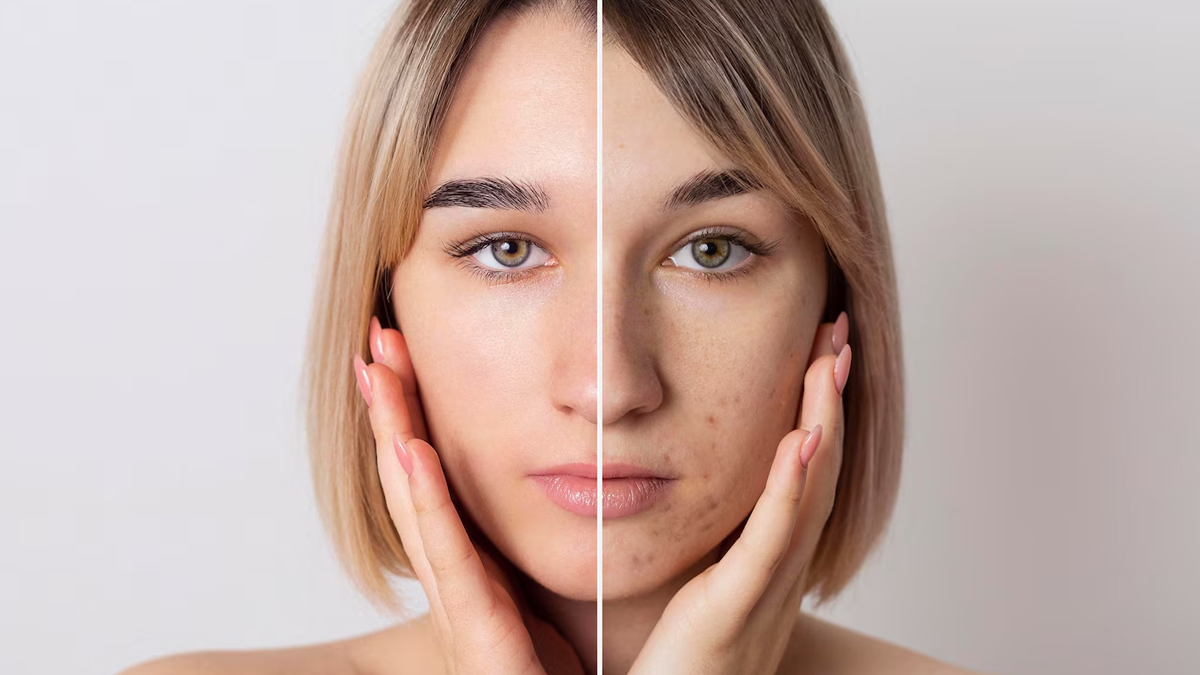
Are you seeing patches of your skin darkening for no apparent reason? Well, it can be confusing, and for most, a reason for alarm. Though most often the result of sun exposure, if you're finding yourself with hyperpigmentation that doesn't fit the sun story, it could be your body trying to tell you something. Unexplained darkening of the skin can, at times, be a sign of deeper health problems, and hence we reached out to our expert, Dr Sanjeev Gulati, Department of Dermatology, Sharda Hospital - Noida. Here is what he shared with us.
Table of Content:-
Health Reasons For Unexplained Skin Darkening
Dr Gulati explained that below are some medical explanations you should be aware of when encountering unexplained darkening of the skin:
1. Hormonal Imbalances
Hormones are involved in many body functions, such as skin colouration. Changes in hormone levels can cause conditions such as:
- Melasma (Chloasma): Commonly called the mask of pregnancy, melasma produces dark, blotchy colouration, usually on the face (cheeks, forehead, upper lip, chin). It is highly associated with pregnancy-related hormonal changes, oral contraceptive use, and hormone replacement therapy. Melasma may become much worse following sun exposure.
- Addison's Disease: A rare disorder in which the adrenal glands do not produce adequate amounts of some hormones, including cortisol and aldosterone. One characteristic feature of Addison's disease is hyperpigmentation of the skin, usually most apparent in areas exposed to sunlight, pressure points (such as knuckles, elbows, knees), scars, and mucous membranes (gums, lining inside cheeks).
2. Insulin Resistance and Diabetes
Insulin resistance, the forerunner to Type 2 Diabetes, may appear on the skin as Acanthosis Nigricans (AN). This is a velvety, hyperpigmented patchy rash, usually in folds of skin including the neck, armpits, and groin. Although AN may be innocent in some cases, its presence usually indicates raised insulin levels and should prompt investigation for diabetes or pre-diabetes.
Also Read: Is Autism Curable? Expert Shares Exclusive Insights

3. Certain Medications
A few drugs have skin hyperpigmentation as a side effect. It can be diffuse darkening or localised spots. Some examples are:
- Antimalarial medications: Chloroquine and hydroxychloroquine can lead to blue-grey discolouration.
- Tetracyclines: Certain antibiotics belonging to this group can cause discolouration, particularly with sun exposure.
- Amiodarone: A cardiac drug that can result in blue-grey discolouration.
- Chemotherapy agents: Most chemotherapy drugs may produce changes in the skin, including hyperpigmentation.
- Oral contraceptives: As noted under hormonal imbalances, these may cause melasma.
If you've recently begun a new prescription and developed skin darkening, it's worth talking to your doctor about. They can perhaps alter your dosage or recommend a different treatment.
4. Inflammatory Conditions and Post-Inflammatory Hyperpigmentation (PIH)
Any inflammation or trauma to the skin will initiate an excess production of melanin, which causes dark patches or spots when the inflammation heals. This is referred to as Post-Inflammatory Hyperpigmentation (PIH). The following are some of the common causes of PIH:
- Acne: Repeated or severe outbreaks of acne can deposit dark spots behind.
- Eczema and Psoriasis: Long-standing inflammatory dermatoses can cause hyperpigmentation of the involved sites.
- Injuries: Cuts, burns, and even aggressive scratching can cause PIH.
Though PIH tends to resolve with time, it is a gradual process and may need to undergo dermatological interventions to hasten lightening.

5. Nutritional Deficiencies
Though not as frequent, deficiencies of some vitamins and minerals can on occasion be linked with skin alterations, such as hyperpigmentation. For example, severe Vitamin B12 deficiency has been reported to cause generalized hyperpigmentation, particularly among people with darker skin.
6. Autoimmune Diseases
Certain autoimmune diseases may manifest as dermatologic findings, including darkening of the skin. Scleroderma, for instance, can lead to thickening and hardening of the skin, at times with hyperpigmentation.
Taking Charge of Your Skin Health
Although treating the underlying medical problem is most important, there are also measures you can take to prevent and control the darkening of the skin. Here are a few ways Dr Gulati shared:
- Sun Protection: This is the golden rule. Use daily broad-spectrum sunscreen with an SPF of 30 or more, dress in protective clothing, and find shade in the middle of the day.
- Gentle Skincare: Steer clear of harsh scrubs or irritating products that can instigate inflammation.
- Targeted Treatments: For PIH or melasma, your dermatologist may prescribe topical creams containing ingredients such as hydroquinone, retinoids, vitamin C, azelaic acid, or kojic acid.
- Laser and Light Therapies: Occasionally, professional therapies such as laser or intense pulsed light (IPL) can also help minimise hyperpigmentation.
Bottomline
Spontaneous skin darkening is often an enigmatic and sometimes upsetting complaint. Knowing the possible health causes and getting medical advice on time, you can proceed towards an unambiguous diagnosis, proper management, and finally, healthier skin. Don't be afraid to contact a physician because maybe your skin is trying to communicate something serious.
How we keep this article up to date:
We work with experts and keep a close eye on the latest in health and wellness. Whenever there is a new research or helpful information, we update our articles with accurate and useful advice.
Current Version